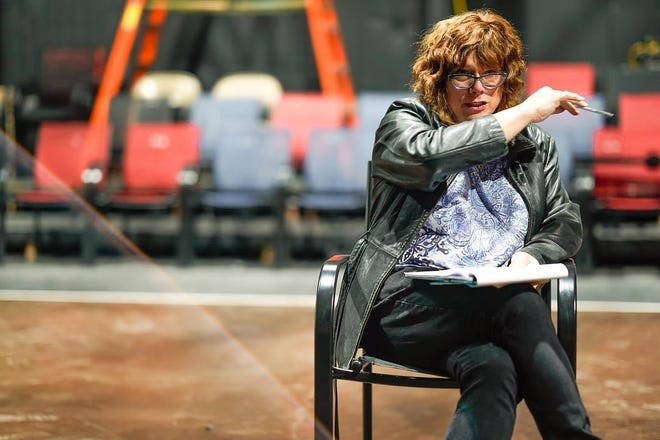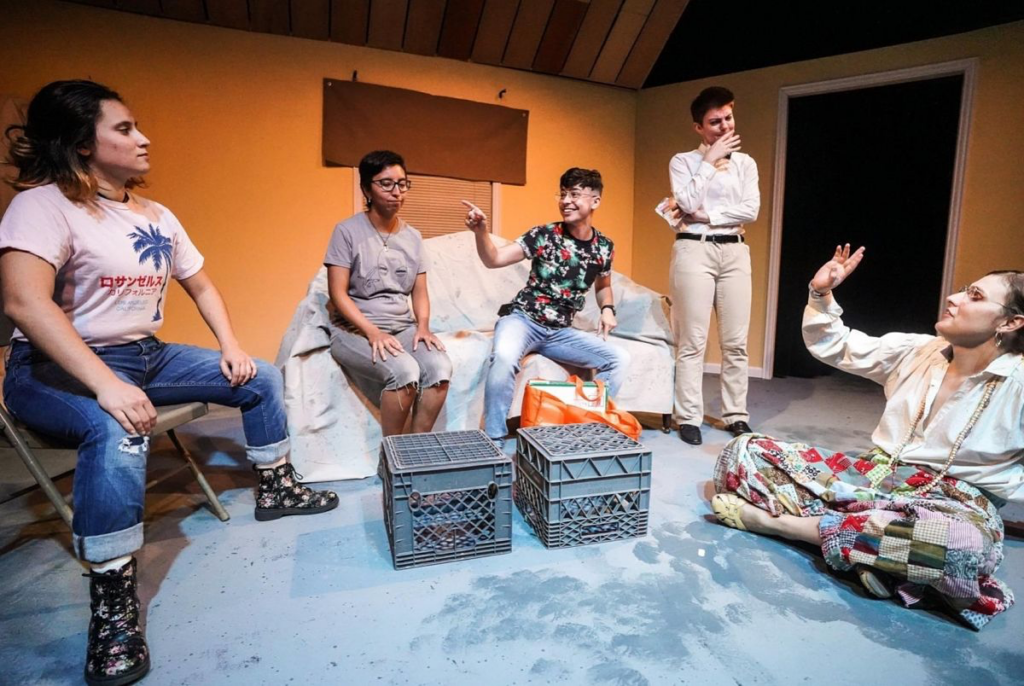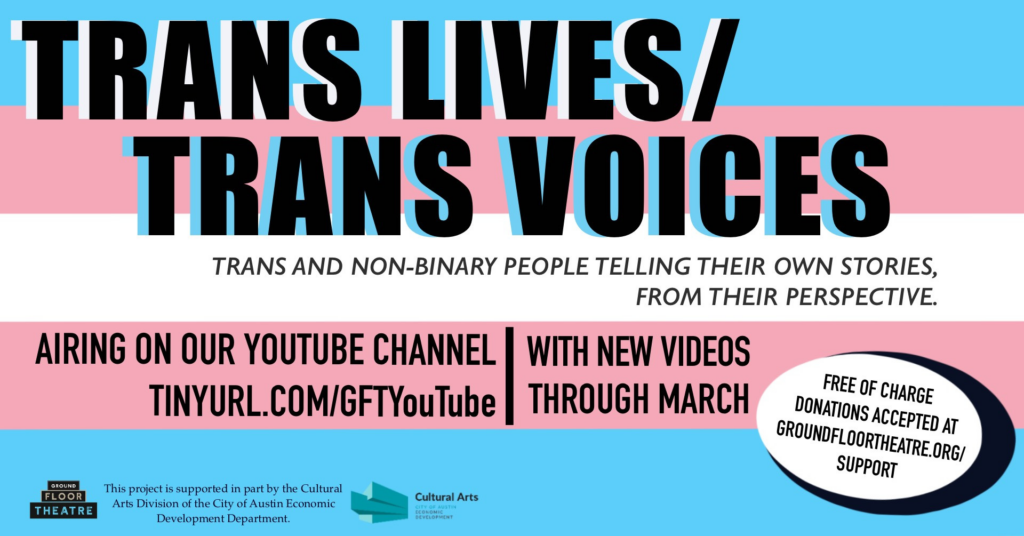On April 13, 2021, University of Texas undergraduate Dimitri Walker interviewed Lisa Scheps as part of Dr. Lauren Gutterman’s upper-level seminar course, “Preserving Austin’s Queer History.”
Scheps is the founder and co-artistic director of Ground Floor Theatre, an Austin theatre devoted to presenting works focusing on historically underrepresented communities including LGBTQ people, people of color, women, and people with disabilities. Scheps is also the creator and host of “Off Stage and On the Air,” a radio show on KOOP 91.7, where she discusses theatre in Austin and beyond.

In addition to being a leader in Austin’s theatre scene, Scheps is a longtime community activist. She is the co-founder of the Transgender Education Network of Texas, an organization committed to “furthering gender-diverse equality in Texas.” She has served on the boards of Equality Texas and the Washington D.C.-based National Center for Transgender Equality. She was a chair of the Austin Human Rights Commission and has been an anti-bias trainer with the Anti-Defamation League.
This interview has been edited and condensed for clarity by Amelia Kimball.
To start things off, could you tell me a little bit about where you grew up, what your neighborhood was like?
I grew up in Houston, Texas, in the ‘70s. And I grew up in a very homogenous, protected, upper middle-class white neighborhood…
I know that you went to North Texas for your theatre degree.
I did indeed. Except, I did not get a degree, I dropped out after one year…College at that time, for me, was more of a life-changing thing with regards to going from my parents’ house, and their rules, to living on my own without anybody’s rules, before I had to go off and make my own money…
By the time I got to college I was already working semi-professionally in theatre. Which is one of the reasons why I didn’t stay there very long. I left after a year and moved to New York…
When you moved to New York was it a big culture shock?
My first year there was very, very difficult. I was a big fish in a small pond, and now I was like hardly a minnow in a huge ocean. So, I wasn’t getting any jobs. One of the rights of passage for anybody in theatre is to get their union card, their actor’s equity card, so I was desperately trying to get that. And I knew people that got it through stage management…I got a job stage managing, and before you knew it, I happened to be very good at it…I was on Broadway in just a few years. Then I got hooked up in doing what we call industrial theatre…And that’s where I made my business for the next 25-30 years. I moved to Chicago in 1994, opened up my own company, and started doing business right away.
I need to say that I have been trans my entire life and knew it, although I did not have the vocabulary to articulate it; it took me years to finally explore my gender issues. So, then I figured out, through a lot of therapy, that I’m transexual, I needed to transition. My business partners, of which I had three at the time, said, “Nah, I don’t think so,” and kicked me out of my own company…So in 2003, I think, I moved to Austin, to be closer to home. My transition forced a little bit of intimacy in my family who were all still in Houston. So, I thought I’d come to Austin, ‘cause that’s the only city in Texas I would be willing to live in.
Opened up my first theatre, Play! Theatre Group, on the east side…And then, six years ago, I decided to take whatever life savings I had and put it towards a new theatre, that was mission-driven. So that was the beginning of Ground Floor Theatre.
You said Austin was the only city you were willing to live in in Texas. Did Austin live up to the reputation of being weird, being accepting?
Well, yeah…As an advocate in the trans community, once I got here, I was very active in the advocacy space, in trans advocacy, and LGBT advocacy, which were the only letters we had at that point. And when people would email me and say, “Hey, I wanna move to Austin, where should I live? I wanna live someplace safe for trans people,” my answer would be, you know, you can live anywhere in Austin. It’s a relatively safe place. I mean, caveat, things can happen anywhere. And that’s one of the reasons why Austin doesn’t have a gayborhood, there’s no central place for the LGBT community, because we never needed one in the past…
So, Austin held its reputation of being a little bit more progressive than other cities, and indeed, when I moved here, it was. But currently, I’m one to say that Austin is not as weird as it thinks it is.
You use theatre as a way to help bring representation to underrepresented groups. Can you think of any ways that theatre has an edge in representation over other forms of activism?

Oh, my god, so much…Art in general has a way of bringing visceral reactions. I had an opportunity in my theatre to really show communities in the light that they are. That people aren’t necessarily accustomed to seeing them. For instance, we did a devised piece called TRANSom, that was devised around the transgender community…what it showed was trans people living “ordinary” lives. Which is a representation that trans and nonbinary people don’t get to see every day.
As any disenfranchised group knows, to see themselves portrayed in the media in any way, shape, especially being “normal,” is a huge thing, and can go a really long way to advance a movement. So that’s what we do at Ground Floor Theatre, and that’s why it’s important to me to always have a lens of forwarding movements and helping people understand the differences in humanity, and instead of fearing them, celebrating them.
With theatre and representation, and everything you do, do you try and guide younger LGBTQ people, try and give them this community, that, maybe, you didn’t have growing up?
Yes…With the theatre, my goal and my ideal is to mentor people, and bring them up, and we have a few people, a few young people, working with us, that I do mentor, and that we keep moving up. They’re not specific LGBTQ, because our mission at the theatre is wider than that, so LGBTQ is just one section. That being said, we have an artist-in-residence program that we’re working with, at the theatre, called GFT In Residence, and our current resident, Siri Gurudev, is queer and nonbinary, and I was just working with them today, working on a project that they are doing.

And we currently we have a project, I don’t know if you’re familiar with it, called Trans Lives Trans Voices, that we’re doing at the theatre, where every Thursday night we’ve been recording people doing stories about their own lives. Five-to-ten-minute stories, and every Thursday night, we premier a new one, and we have a talkback that I moderate. And, so far, we’ve had, probably ten or twelve of these…
Community comes up every time. It comes up every time, how important that is. And indeed, when I look at my story, and my coming to terms with my gender identity, until I embraced the community—and it took some time to do that, because I was—I was part of the “mainstream,” you know, I wasn’t one of “those people.” It took a while for me to say, “hey, I am one of those people,” and those people were pretty fucking incredible. It took me a while to get to that point. And that’s important. So, if I’m given the opportunity to counsel a queer person, that’s what I say, “find community,” that’s gonna be your most important thing.
With all the work you’ve done with Ground Floor Theatre, would you consider yourself to be a community leader?
Let me comment to one thing that you said. With regards to trans advocacy, nationwide, I’m generation two. I stand on the shoulders of a lot of people. Here in town, I stand on the shoulders of others. I stand on the shoulders, in many ways, of Monica Roberts, although we didn’t see, in many ways, eye to eye all the time. Oh, Phyllis Frye, who is now a judge. She’s the first transgender judge. So, the answer to the question is second generation, there was work that went on before I got there. But I am one of the elders, I’ll wear that moniker proudly, I’m one of the elders. I’m not as active anymore, but certainly I’m one of the local elders…

Earlier, you had talked about how Austin didn’t really have a designated gay neighborhood. Do you think this was a benefit, or more of a detriment, to the Austin LGBTQ community, as a whole?
I think people will disagree with me on this, but I think it was a benefit, just because it spoke volumes about the city. That being said, flash forward right now, it would be really great to have an LGBTQ resource center. And those usually bear themselves from a neighborhood community, which we don’t have. There are people that have been– that are trying to do that, but we don’t have that. So, there isn’t a place that you can go, like say– “oh, I wanna hang with the gays today,” and go to some area. I mean, 4th street has kinda turned into that, a little bit, but I think ultimately, or at least back in the day, it was a good thing. Now, I think we could benefit from some kind of community gathering place. Be it a neighborhood, or a building.
I completely agree.
